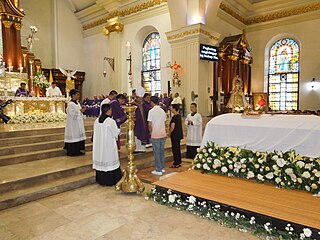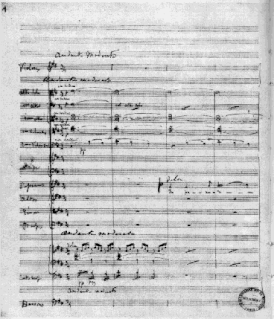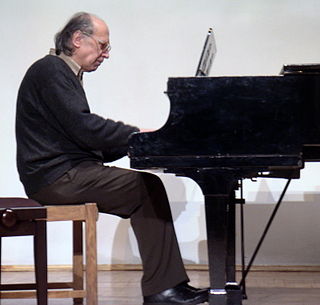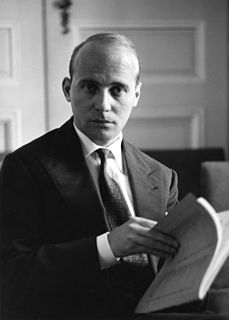
Krzysztof Eugeniusz Penderecki was a Polish composer and conductor. His best known works include Threnody to the Victims of Hiroshima, Symphony No. 3, his St Luke Passion, Polish Requiem, Anaklasis and Utrenja. Penderecki's oeuvre includes four operas, eight symphonies and other orchestral pieces, a variety of instrumental concertos, choral settings of mainly religious texts, as well as chamber and instrumental works.

The War Requiem, Op. 66, is a large-scale setting of the Requiem composed by Benjamin Britten mostly in 1961 and completed in January 1962. The War Requiem was performed for the consecration of the new Coventry Cathedral, which was built after the original fourteenth-century structure was destroyed in a World War II bombing raid. The traditional Latin texts are interspersed, in telling juxtaposition, with extra-liturgical poems by Wilfred Owen, written during World War I.

A Requiem or Requiem Mass, also known as Mass for the dead or Mass of the dead, is a Mass offered for the repose of the soul or souls of one or more deceased persons, using a particular form of the Roman Missal. It is usually, but not necessarily, celebrated in the context of a funeral.
SATB is an initialism that describes the scoring of compositions for choirs, and also choirs of instruments. The initials are for the voice types: S for soprano, A for alto, T for tenor and B for bass.

Gabriel Fauré composed his Requiem in D minor, Op. 48, between 1887 and 1890. The choral-orchestral setting of the shortened Catholic Mass for the Dead in Latin is the best-known of his large works. Its focus is on eternal rest and consolation. Fauré's reasons for composing the work are unclear, but do not appear to have had anything to do with the death of his parents in the mid-1880s. He composed the work in the late 1880s and revised it in the 1890s, finishing it in 1900.

Valentyn Vasylyovych Sylvestrov is a Ukrainian composer and pianist, who plays and writes contemporary classical music.

The Requiem, Op. 9, is a 1947 setting of the Latin Requiem by Maurice Duruflé for a solo voice, mixed choir, and organ, or orchestra with organ. The thematic material is mostly taken from the Mass for the Dead in Gregorian chant. The Requiem was first published in 1948 by Durand in an organ version.

Polish Requiem, also A Polish Requiem, is a large-scale requiem mass for soloists, mixed choir and orchestra by the Polish composer Krzysztof Penderecki. The Lacrimosa, dedicated to the trade union leader Lech Wałęsa, was written for the unveiling of a statue at the Gdańsk Shipyard to commemorate those killed in the Polish anti-government riots in 1970. He expanded the work into a requiem, writing other parts to honour different patriotic events over the next four years.

John Rutter's Requiem is a musical setting of parts of the Latin Requiem with added psalms and biblical verses in English, completed in 1985. It is scored for soprano, mixed choir and orchestra or chamber ensemble.

Hans Werner Henze composed the nine Sacred Concertos that comprise his Requiem over the course of three years from 1991 to 1993 on commissions from the London Sinfonietta, Suntory Corporation for the NHK Philharmonic, and Westdeutscher Rundfunk, Cologne. The first movement, Introitus: Requiem Aeternam was commissioned by the London Sinfonietta as part of a memorial concert for Artistic Director Michael Vyner who died on 20 October 1989. In addition to Henze, the London Sinfonietta also commissioned seven other prominent composers to write works in Vyner's memory to make up the program which was performed on the 6 May 1990.
Volker David Kirchner was a German composer and violist. After studies of violin and composition at the Peter Cornelius Conservatory, the Hochschule für Musik Köln and the Hochschule für Musik Detmold, he worked for decades as a violist in the Radio-Sinfonie-Orchester Frankfurt. He was simultaneously the violist in the Kehr Trio founded by his violin teacher Günter Kehr, and a composer of incidental music at the Hessisches Staatstheater Wiesbaden.

Krzysztof Penderecki wrote his Seventh Symphony, subtitled "Seven Gates of Jerusalem", in 1996 to commemorate the third millennium of the city of Jerusalem. Originally conceived as an oratorio, this choral symphony was premièred in Jerusalem in January 1997; it was only after the first Polish performance two months later that Penderecki decided to call it a symphony. It is written for two sopranos, alto, tenor, bass, narrator, chorus and orchestra.
Harald Feller is a German organist, choral conductor and composer teaching at the Hochschule für Musik und Theater München. He was awarded the 1983 Grand Prix du Disque Liszt.
The Music for the Requiem Mass is any music that accompanies the Requiem, a Mass in the Catholic Church for the deceased. It has inspired a large number of compositions, including settings by Mozart, Berlioz, Donizetti, Verdi, Bruckner, Dvořák, Fauré and Duruflé. Originally, such compositions were meant to be performed in liturgical service, with monophonic chant. Eventually the dramatic character of the text began to appeal to composers to an extent that they made the requiem a genre of its own, and the compositions of composers such as Verdi are essentially concert pieces rather than liturgical works.

Magnificat is a large-scale sacred composition, a musical setting of the biblical canticle Magnificat, for bass soloist, men's and boys' voices, two mixed choirs, and orchestra, by Krzysztof Penderecki, completed in 1974. It was commissioned for the 1200th anniversary of the Salzburg Cathedral, where it was premiered on 17 August 1974, conducted by the composer.

The National Philharmonic in Warsaw is a Polish cultural institution, located at 5 Jasna Street in Warsaw. The building was built between 1900 and 1901, under the direction of Karol Kozłowski, to be reconstructed in 1955 by Eugeniusz Szparkowski. The director of the institution is Wojciech Nowak. It is the main venue of the Warsaw National Philharmonic Orchestra.
Requiem für einen jungen Dichter is an extended composition by Bernd Alois Zimmermann, written from 1967 to 1969 for two speakers, soprano and baritone soloists, three choirs, jazz band, organ, tapes and a large orchestra. Subtitled Lingual, it sets a text that includes the Latin liturgical Mass for the Dead and literary, philosophical, religious and political texts, related to politics and the history of mind during the composer's life. The work has elements of a cantata, an oratorio and an audio play.

Credo is a large-scale sacred composition for soloists, children's choir, mixed choir and orchestra by Krzysztof Penderecki, completed in 1998. It was commissioned by Helmuth Rilling for the Oregon Bach Festival, where it was first performed on 11 July 1998. Penderecki expanded the liturgical text by hymns and Bible verses in Latin, Polish and German. A recording won the 2000 Grammy Award for best choral performance.

Kai Bumann was a German conductor who led orchestras and opera companies mainly in Poland, such as the Opera Krakowska, Warsaw Chamber Opera and the Polish Baltic Philharmonic. He was conductor and artistic director of the Swiss National Youth Symphony Orchestra (SJSO) from 1998 until his death.










